(page1).jpg.jpg)
Title: Aliened American - April 9, 1853
Speaker or author: editor
Newspaper or publication: Aliened American (1853 - 1877)
The editor announces with this the first issue of the Aliened American newspaper its mission statement; community goals; and the names of contributing writers and supporters.
Description of file(s): three scanned newspaper pages (five columns)
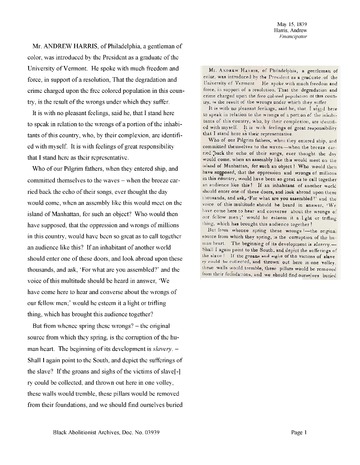
Speaker or author: Harris, Andrew, of Philadelphia
Newspaper or publication: Emancipator
Speech against the injustices and horrors of slavery given at the annual meeting of the American Anti-Slavery Society.
Description of file(s): PDF 4 page, 1,165 word document (text and images)
(page1).jpg.jpg)
Title: Anglo-African - August 26, 1865
Speaker or author: editor
Newspaper or publication: Anglo-African (1863 - 1865)
The writer tells his readers that while the white portion of the population is prejudiced against the black portion, the black portion feels no prejudice against the white. He emphasizes that what African Americans feel towards their white counterparts is actually a lack of trust and not prejudice.
Description of file(s): one scanned newspaper column
(page1).jpg.jpg)
Title: Anglo-African - September 3, 1865
Speaker or author: editor
Newspaper or publication: Anglo-African (1863 - 1865)
The writer tells his readers of the current violence following in the aftermath of the Civil War. Although slavery has been abolished, it has created an atmosphere of hatred in the Southern states as the newly freed slaves stand as a symbol of the defeat of the Confederacy. This is resulting in wholesale murder and mob violence.
Description of file(s): two scanned, two columned, newspaper pages
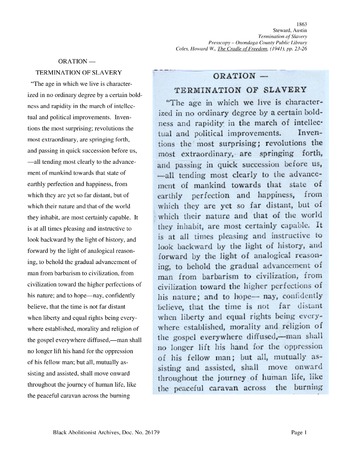
Speaker or author: Steward, Austin
Newspaper or publication: Presscopy -- Onondaga County Public Library [Coles, Howard W., The Cradle of Freedom, (1941), pp. 23-26]
At the termination of slavery in the U.S., the speaker reflected on what had been an accepted economic mainstay in the system of slavery and what potential for change was now available for all U.S. citizens. He urged his audience to take advantage of the opportunity to prosper by adopting a Christian lifestyle, avoiding "hard spirits," and focusing on civil rights.
Description of file(s): PDF 10 page, 2,307 word document (text and images)
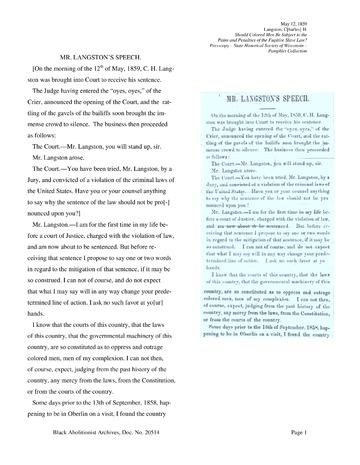
Speaker or author: Langston, C. H. (Charles Henry), b. 1821?
Newspaper or publication: Presscopy -- State Historical Society of Wisconsin -- Pamphlet Collection
Eloquent speech delivered before a court about to pronounce sentence on the speaker for his actions in working against the Fugitive Slave Law. After his impassioned call for reason, justice, and humanity in the exercising of the Fugitive Slave Law, the speaker was fined $100 and sentenced to 20 days in jail.
Description of file(s): PDF 13 page, 4,108 word document (text and images)
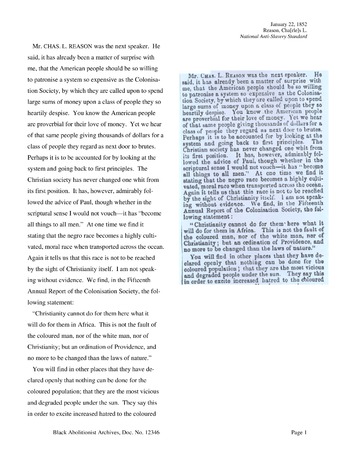
Speaker or author: Reason, Charles Lewis, 1818-1893
Newspaper or publication: National Anti-Slavery Standard
Speech denouncing the plans and goals of the American Colonization Society. The speaker stressed that this idea is just a scheme to remove African Americans from the U.S.
Description of file(s): PDF 5 page, 1,221 word document (text and images)
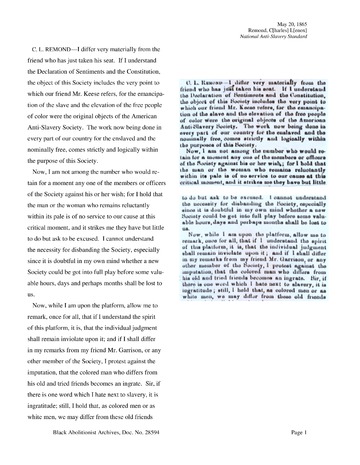
Speaker or author: Remond, Charles Lenox, 1810-1873
Newspaper or publication: National Anti-Slavery Standard
The speaker noted that while slavery had ended, as long as equality did not exist between the races, the work of the Anti-Slavery movement would continue. He believed that now was not the time to abandon work for civil rights and social acceptance of the newly freed slaves.
Description of file(s): PDF 4 page, 955 word document (text and images)
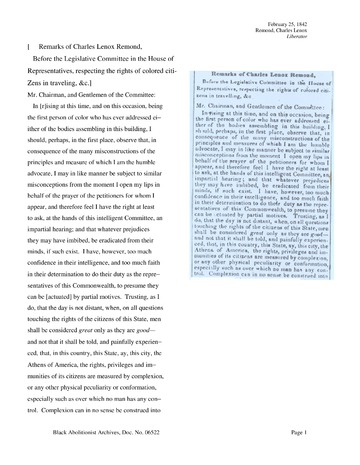
Speaker or author: Remond, Charles Lenox, 1810-1873
Newspaper or publication: Liberator
Address given before the Legislative Committee in the House of Representatives regarding "the rights of colored citizens when traveling" and civil rights in general.
Description of file(s): PDF 8 page, 2,220 word document (text and images)
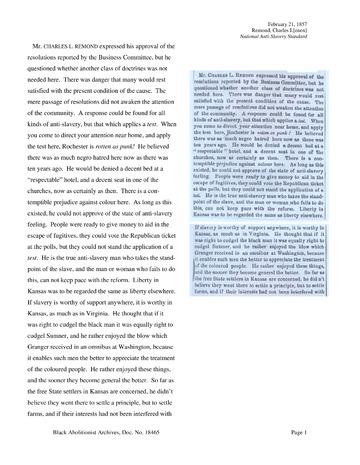
Speaker or author: Remond, Charles Lenox, 1810-1873
Newspaper or publication: National Anti-Slavery Standard
The speaker said that prejudice in New York was just as prevelant as it always had been, that no number of resolutions created in any convention could change this. The speaker called for true reform of the current political system in place in free states with regard to prejudice based on color.
Description of file(s): PDF 2 page, 526 word document (text and images)
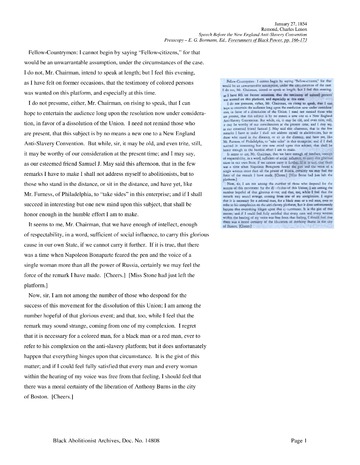
Speaker or author: Remond, Charles Lenox, 1810-1873
Newspaper or publication: Presscopy -- E. G. Bormann, Ed., Forerunners of Black Power, p. 166-173
Speech delivered amidst fears of the dissolution of the Union based on racial tension and issues of hatred and slavery. (Speech 15303 is a duplicate of this speech.)
Description of file(s): PDF 8 page, 3,293 word document (text and images)
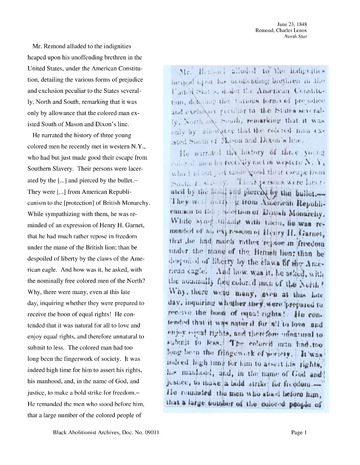
Speaker or author: Remond, Charles Lenox, 1810-1873
Newspaper or publication: North Star
Speech delivered before the New England Anti-Slavery Convention held in Boston encouraging continued efforts in the work towards the abolition of slavery.
Description of file(s): PDF 3 page, 617 word document (text and images)
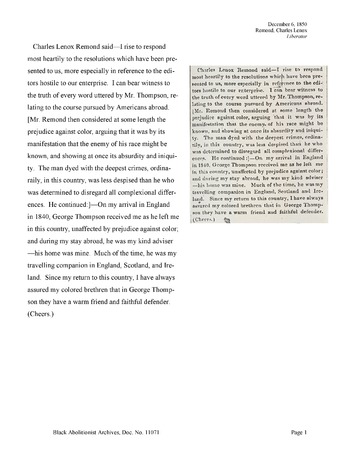
Speaker or author: Remond, Charles Lenox, 1810-1873
Newspaper or publication: Liberator
Continuation of welcome to George Thompson (see speech 11054) upon his visit to Boston. The speaker stressed that prejudice was the "chief enemy of his race" and that he was unaffected by prejudice while in Great Britain.
Description of file(s): PDF 1 page, 198 word document (text and image)
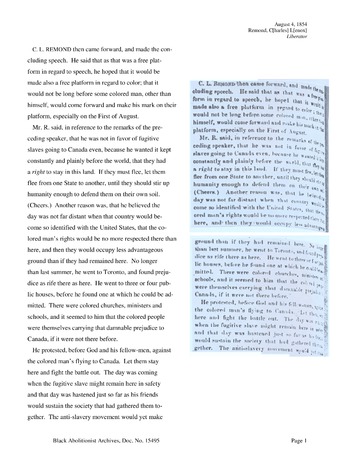
Speaker or author: Remond, Charles Lenox, 1810-1873
Newspaper or publication: Liberator
Speech regarding the speaker's belief that slaves fleeing to Canada were making a mistake. He said that he found just as much prejudice there as in the U.S. and it seemed to him that the black people were perpetuating this themselves.
Description of file(s): PDF 2 page, 564 word document (text and images)
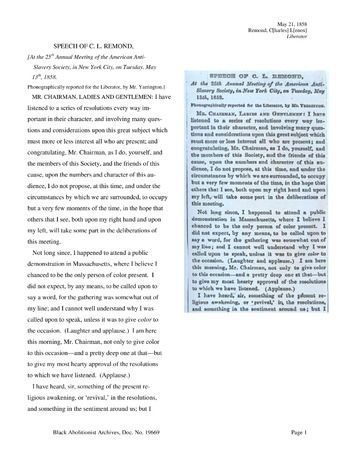
Speaker or author: Remond, Charles Lenox, 1810-1873
Newspaper or publication: Liberator
Speech given in response to a resolution presented before the American Abolition Society meeting. The speaker said that so far all attempts at a peaceful resolution to the issue of slavery have failed. He could see the direction the country was going, and while he didn't agree with dissolving the Union, he could understand the need for radical change at that point.
Description of file(s): PDF 10 page, 2,925 word document (text and images)
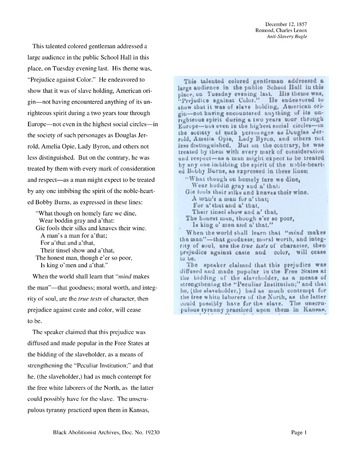
Speaker or author: Remond, Charles Lenox, 1810-1873
Newspaper or publication: Anti-Slavery Bugle
The speaker's topic was "Prejudice against Color." He emphasized that he had not experienced prejudice during his travels in Europe, but had encountered it only in the U.S. He believed prejudice to be "unnatural" and that a human being should be recognized for his character and moral worth instead of the color of his skin.
Description of file(s): PDF 2 page, 334 word document (text and images)
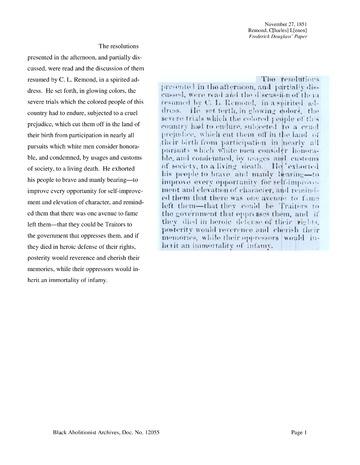
Speaker or author: Remond, Charles Lenox, 1810-1873
Newspaper or publication: Frederick Douglass' Paper
Brief overview of a speech expressing an appreciation for the endurance of African Americans who were dealing with the cruelties of slavery and prejudice. The speaker encouraged them to defend their rights even if it meant being "traitors" to the government.
Description of file(s): PDF 1 page, 156 word document (text and image)
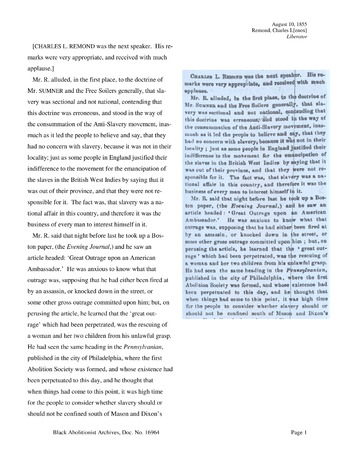
Speaker or author: Remond, Charles Lenox, 1810-1873
Newspaper or publication: Liberator
Overview of speech regarding the speaker's view of the current status of the anti-slavery movement. The speaker said he saw this not as a racial issue, but as a human issue. He believed the system of slavery had a negative effect on every American, regardless of color. He believed that ending slavery freed all Americans.
Description of file(s): PDF 3 page, 823 word document (text and images)
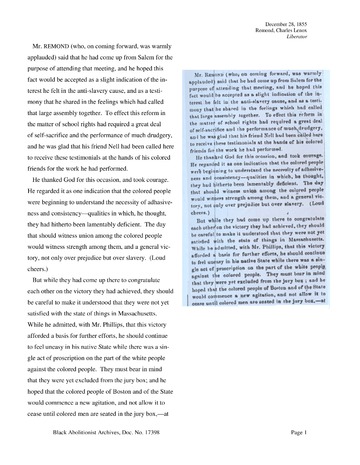
Speaker or author: Remond, Charles Lenox, 1810-1873
Newspaper or publication: Liberator
Speech stressing the need for continued improvements in the social acceptance of the African American, including all civil rights. The speaker emphasized the justice of including black jurors, especially for trials involving black defendants.
Description of file(s): PDF 5 page, 1,275 word document (text and images)
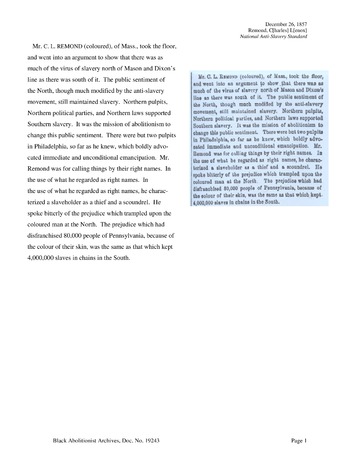
Speaker or author: Remond, Charles Lenox, 1810-1873
Newspaper or publication: National Anti-Slavery Standard
The speaker believed that northern support of southern slavery was keeping the institution of slavery alive. He believed slavery would continue as long as it was supported by the Union.
Description of file(s): PDF 1 page, 183 word document (text and image)
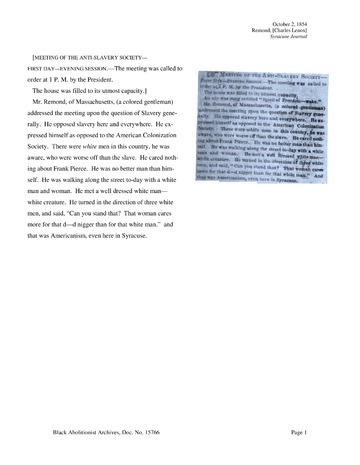
Speaker or author: Remond, Charles Lenox, 1810-1873
Newspaper or publication: Syracuse Journal
Brief speech denouncing the goals of the American Colonization Society; and recounting a personal experience with prejudice.
Description of file(s): PDF 1 page, 164 word document (text and image)
spe.pdf.jpg)
Speaker or author: Remond, Charles Lenox, 1810-1873
Newspaper or publication: Liberator
Overview of speech given in response to another speaker's comment that prejudice to color in the U.S. was the same as prejudice to caste in European countries. The speaker disagreed with this since he believed that black Americans were treated far worse than lower caste citizens in other countries.
Description of file(s): PDF 2 page, 457 word document (text and images)
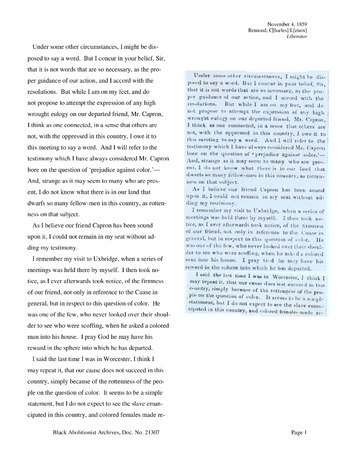
Speaker or author: Remond, Charles Lenox, 1810-1873
Newspaper or publication: Liberator
Brief eulogy to the memory of the late president of the Massachusetts Anti-Slavery Society, emphasizing his efforts toward the abolition of slavery.
Description of file(s): PDF 2 page, 463 word document (text and images)
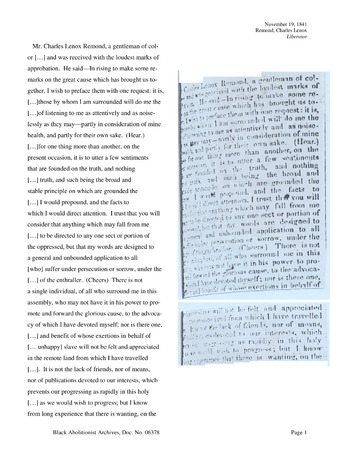
Speaker or author: Remond, Charles Lenox, 1810-1873
Newspaper or publication: Liberator
Speech given before a meeting of the Hibernian Anti-Slavery Society regarding the continued injustices and horrors of American slavery, and how this is perceived by people in other countries.
Description of file(s): PDF 19 page, 5,634 word document (text and images)
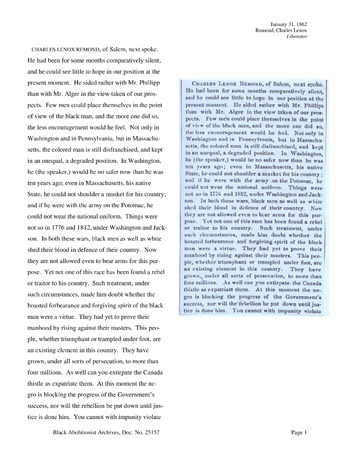
Speaker or author: Remond, Charles Lenox, 1810-1873
Newspaper or publication: Liberator
Brief speech in which the speaker expressed his dismay that African Americans were not welcomed into the army to fight for their own freedom. He noted that they had fought in 1776, but now were not permitted to bear arms.
Description of file(s): PDF 2 page, 361 word document (text and images)



